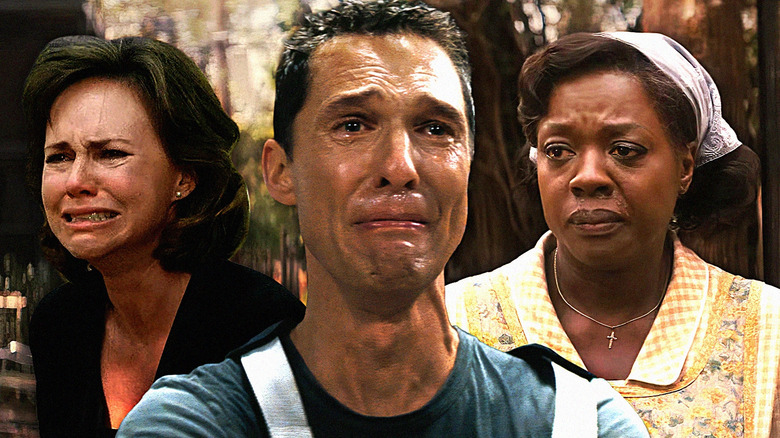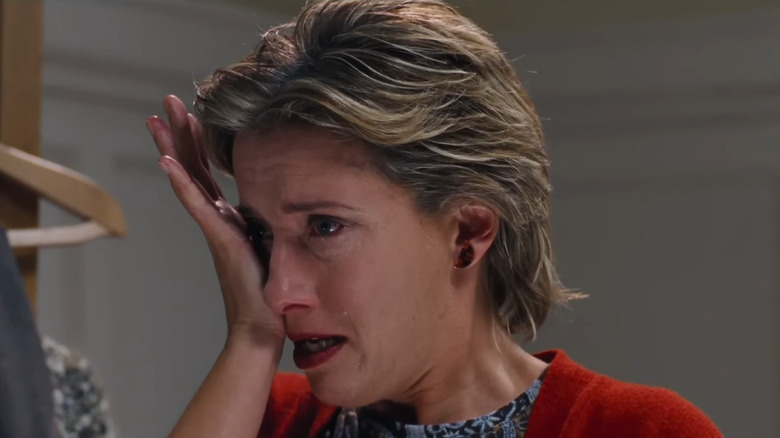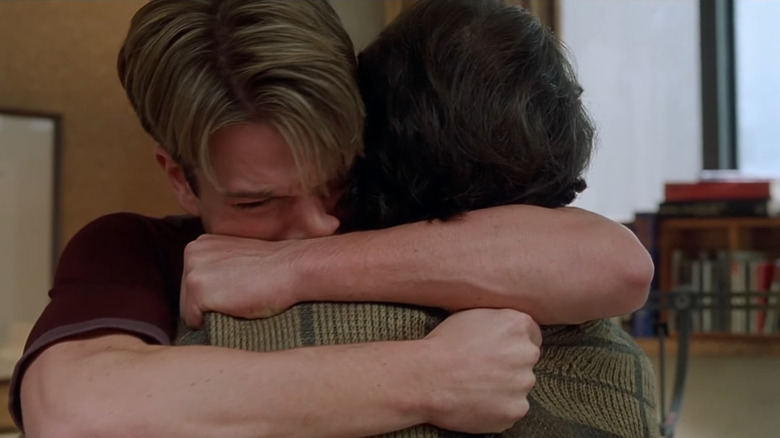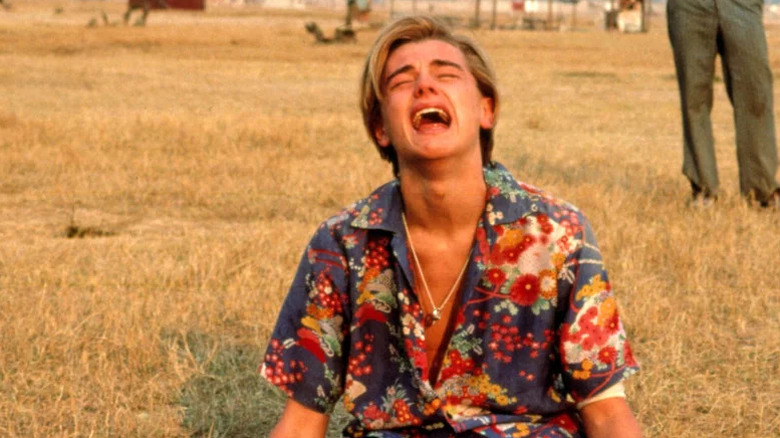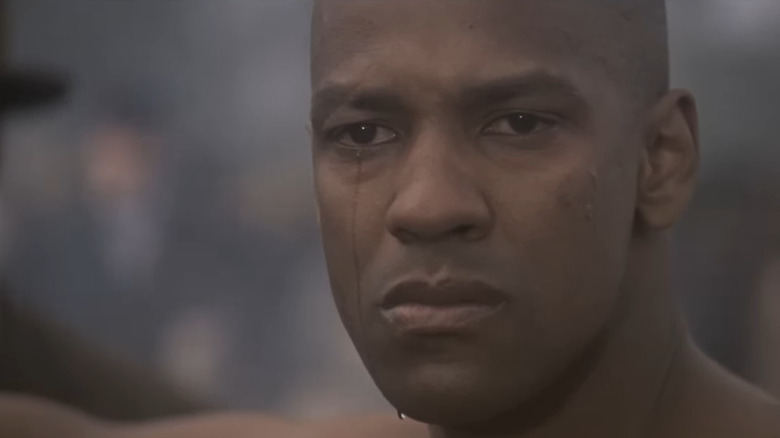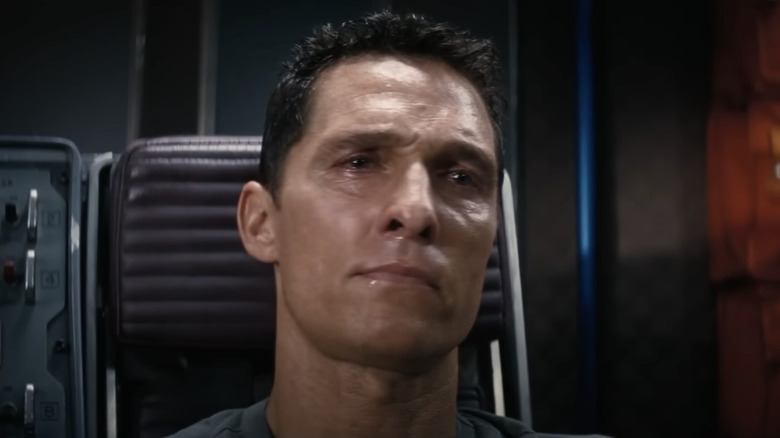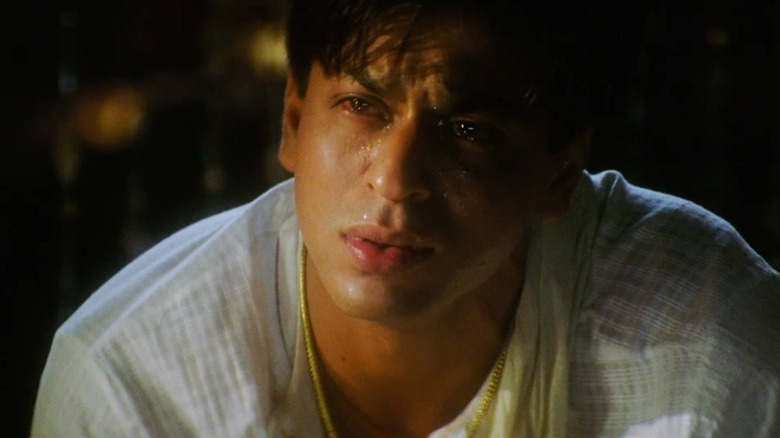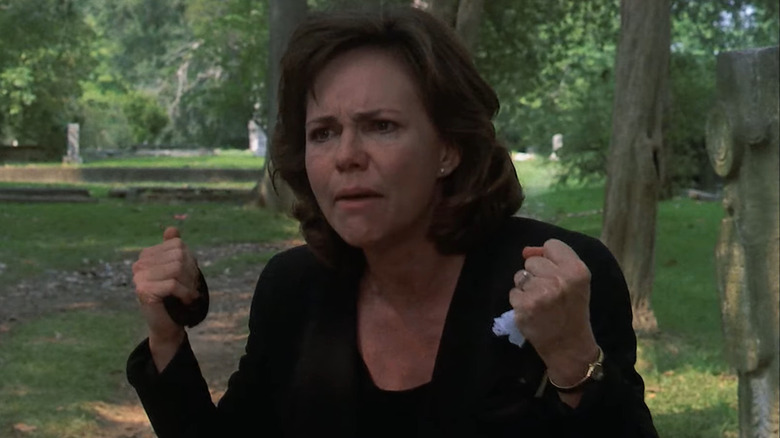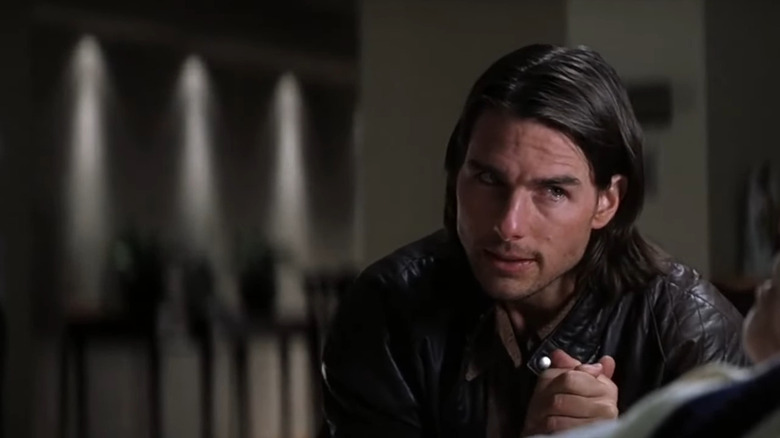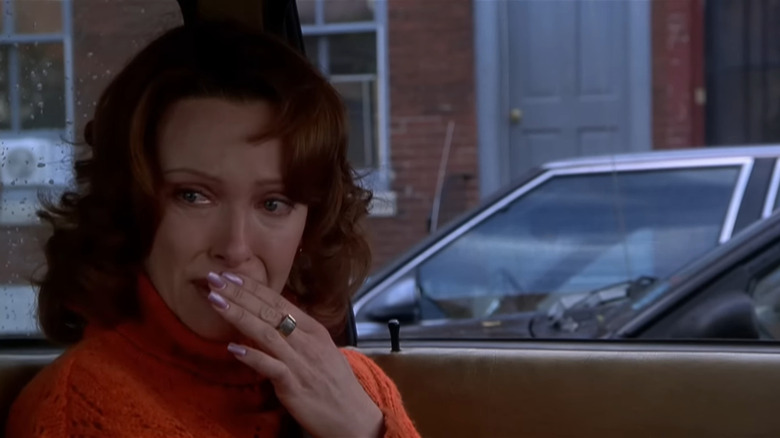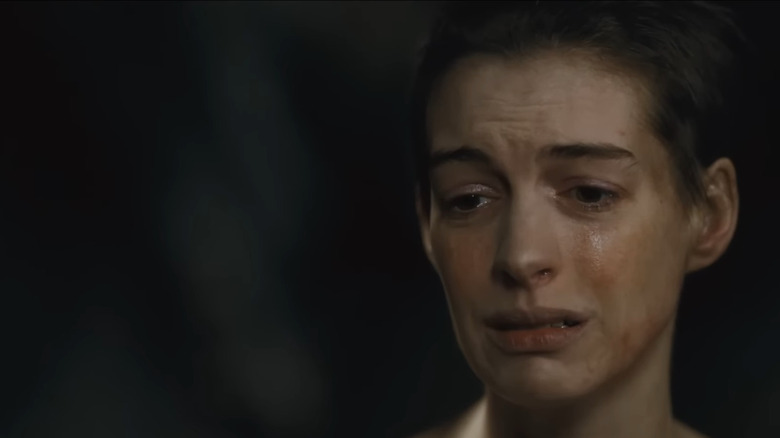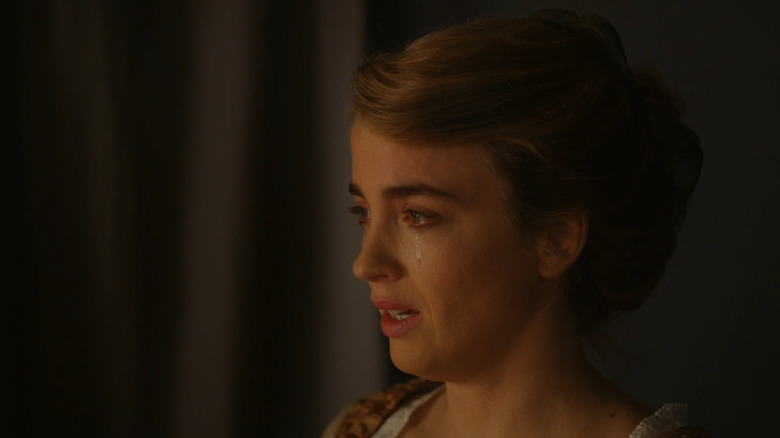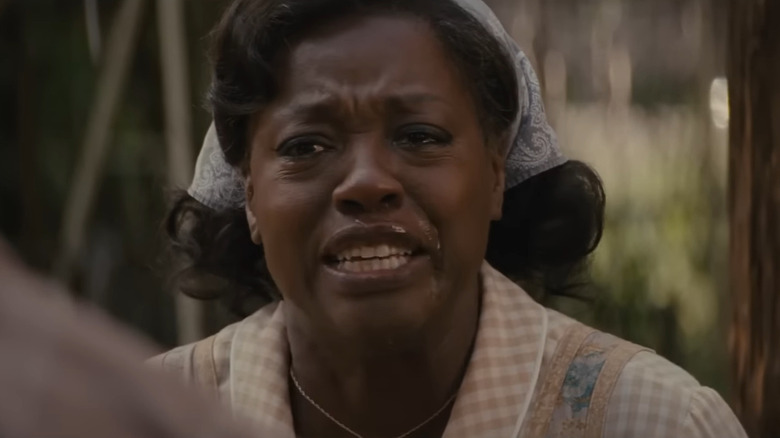The 12 Best Crying Scenes In Movies, Ranked
Crying, one of the most primal expressions of emotion, translates across language and culture, often bringing viewers themselves to tears. But not all movie crying is created equal. Tears don't automatically make a great movie scene; the combination of acting, directing, and writing does.
It's difficult to properly calibrate the intensity of a crying scene. Should the actor be full-on sobbing or ugly crying a lá Tobey Maguire in the "Spider-Man" films? Should the tears look elegant and composed, like Cher's beautiful tears at the opera in "Moonstruck"? The audience has to believe that the character's circumstances are worth crying over and that their tears are genuine, lest they laugh instead of feeling empathetic.
The best cinematic crying scenes require actors to showcase their acting chops while also adding depth to the character and the story. When done well, tearful moments wordlessly let the viewer in on a character's true feelings. Scenes like this become iconic because they're profound enough to stick in moviegoers' minds long after the credits roll. We've compiled the 12 best crying scenes in movie history, so get your tissues ready.
Emma Thompson crying to Joni Mitchell in Love, Actually
Beloved by many as a Christmas classic, certain parts of "Love, Actually" didn't age well. But there's one scene in "Love Actually" that's undeniably good, whether you like the film or not. One subplot follows Daniel (Liam Neeson) and Karen (Emma Thompson), a middle-aged married couple with kids. In the lead-up to Christmas, Karen finds a beautiful necklace her husband bought and assumes it's a gift for her. She finds out on Christmas morning that the gift was actually for his mistress.
A great piece of writing and a brilliant performance from Thompson, the scene hits all the right emotional notes. Karen opens her gift and finds a Joni Mitchell CD rather than the necklace. Moments later, she makes an excuse to leave and shuts herself in the bedroom. Karen puts on the CD, and we enter the scene with "Both Sides Now" playing. She stands stock-still in the bedroom as silent tears begin to fall. Karen gives herself a moment to cry before blotting her face and returning to her family, fussing with the bedspread as she leaves.
It's an understated performance from Thompson, but that's why it's so powerful. She barely allows herself time to grieve her marriage before going back to her family, and watching her put herself back together and resume celebrating Christmas is heartbreaking.
Robin Williams tells Matt Damon it's not his fault in Good Will Hunting
One of Matt Damon's most celebrated performances, "Good Will Hunting" –- which he wrote with friend and co-star Ben Affleck -– is best remembered for one highly emotional scene. Damon plays Will, a self-sabotaging troublemaker and math genius who works as a janitor. Will begins seeing a therapist, Dr. Sean Maguire (Robin Williams), as a requirement to continue working with a professor who discovered his talents.
Initially, Will dismisses the idea of therapy and refuses to take Sean seriously. Eventually, they have a breakthrough, and Will reveals the abuse he suffered as a child. Sean gives Will one last piece of wisdom during their final session together. "It's not your fault," Sean tells him, referring to his abusive foster father. Will says, "I know," but Sean keeps repeating the phrase until it hits home. Will's tears turn to sobs, and he stands in Sean's office crying into his arms like he couldn't do as a boy.
Though it's Damon who sheds tears, Williams' performance is just as important. His kind, compassionate, and patient demeanor warms the heart, and his openness and fatherly care in this scene allow Will to find peace. Damon's Will could only have this vulnerable moment with Williams' generous, goodhearted Sean, and the combination of those two stirring performances results in a poignant, memorable scene.
Leonardo DiCaprio defies the stars in Romeo + Juliet
Leonardo DiCaprio cries more in movies than almost any of his peers. He's shed tears in over a dozen films, brimming with passion and despair in each of them. In Baz Luhrmann's "Romeo + Juliet," the movie that ushered in the era of cool Shakespeare, DiCaprio cries on several occasions. In the play's memorable conclusion, Romeo breaks down upon discovering Juliet dead (or so he thinks). But that's not the film's greatest crying scene. That comes shortly before the lovers' final moments.
Romeo's cousin, Balthasar (Jesse Bradford), comes to the trailer park where Romeo is hiding and informs him of Juliet's death, not knowing about the potion she took. Romeo walks further into the desert, sinking to his knees in despair. "I defy you stars," he yells at the sky, wracked with sobs. He then screams Juliet's name before losing his breath, overcome by sobs and grief.
DiCaprio's devotion to the film's vivid emotional register and his boyish demeanor both contribute to this scene's potency. His cries sound like those of a boy, reminding how young the lovers are. His reaction comes off as adolescent angst, while his extreme passion lends itself to the film's theatrical tone. The film –- and this scene –- are classics for a reason, owing as much to the actors' enthusiastic performances as to Luhrmann's creative direction.
Denzel Washington sheds a single tear in Glory
The cast of "Glory" includes many talented actors -– Denzel Washington, Morgan Freeman, Andre Braugher, Matthew Broderick, Cary and Elwes –- but only one of them won an Academy Award for the film. Broderick plays real-life soldier Colonel Robert Gould Shaw, who led an African American regiment in the Civil War, and Washington plays Trip, a formerly enslaved member of the regiment.
Washington won his first Oscar for "Glory," in large part due to one tearful moment. The scene takes place after Trip deserts (for a good reason) and is caught. The racist Sergeant Major Mulcahy (John Finn) demands that Trip be flogged, and Shaw acquiesces. When Mulcahy rips Trip's shirt off, we see the dozens of scars on his back. Trip rips off the rest of his shirt and defiantly looks at Shaw as he settles into his position. There's no fear in his eyes, just anger and defiance.
He stares Shaw down with a look of contempt, but not surprise –- he's come to expect this kind of treatment. Near the end of his punishment, a single tear rolls down Trip's face, revealing that while he may be strong, he's still a human being, and he can be hurt. This moment is a major reason why it was Washington's breakout film and the best Civil War movie ever made.
Matthew McConaughey crying over lost time in Interstellar
"Interstellar," Christopher Nolan's emotional masterpiece, contains a famous crying scene involving Matthew McConaughey. Though the scene may feel like old news to chronically online folks, it's worth considering alongside some of cinema's best tearful moments.
McConaughey plays Cooper, a NASA pilot turned farmer living through a climate apocalypse. He goes on a space mission to colonize a habitable planet, leaving his children behind. Due to time dilation, once Cooper leaves the planet, 23 years on Earth have passed. Cooper receives years worth of messages from his kids, Tom (Timothée Chalamet, then Casey Affleck) and Murph (Jessica Chastain). Tom tells Cooper of meeting his wife, having a son, and the death of his grandfather. He only receives one message from a still-angry Murph, when she's the same age as Cooper was when he left.
McConaughey only utters a few words, and he plays the scene alone, staring at a TV screen. Despite these unusual circumstances, McConaughey gives a gut-wrenching performance that emphasizes how much pain this missing time has caused him. It's a devastating turn of events, and McConaughey delivers the level of despair the scene necessitates.
Shah Rukh Khan drowns his sorrows by the river in Devdas
Bollywood star Shah Rukh Khan (often known as SRK) is undoubtedly one of the greatest on-screen criers in cinema history. He cries in a significant portion of his films, sometimes several times per picture. Khan's tears somehow appear bigger and more vibrant than the tears of other actors.
Some of his best crying occurs in the 2002 movie "Devdas." Khan plays Devdas Mukherjee, a wealthy young man returning home after a decade studying in London. Devdas reunites with his childhood best friend, Paro (Aishwarya Rai), and they fall in love. They'd like to get married, but Devdas' mother disapproves because they are from different castes. After much back and forth between the families, Devdas gives up on Paro, and she marries an older widower.
After losing Paro, Devdas visits a brothel, where he meets a beautiful and kindhearted courtesan, Chandramukhi (Madhuri Dixit). Chandramukhi falls in love with Devdas, while Devdas falls into alcoholism. In one tragic moment, Devdas is drunk by the river following a Durga Puja festival. Chandramukhi tries to comfort him, but he behaves belligerently, hurling hurtful words and breaking glass bottles. Khan cries for most of the nearly five-minute scene, oscillating between anger and anguish. It's a masterful performance from Khan, and though quite theatrical, the scene serves as the film's emotional center.
Sally Field's funeral monologue in Steel Magnolias
The classic film "Steel Magnolias" follows a group of close-knit women in a small Louisiana town. The incredible ensemble cast includes Sally Field, Julia Roberts, Dolly Parton, Olympia Dukakis, Shirley MacLaine, and Daryl Hannah. Field plays M'Lynn, whose daughter, Shelby (Julia Roberts), has type 1 diabetes. Shelby's death, a year after she gives birth to her first child, serves as the turning point of the movie.
The best scene in the movie takes place after Shelby's funeral. M'Lynn begins by describing how much Shelby's death saddens her, but how she was grateful to have been with her at the start of her life and the very end. Then her anger bubbles up. She begins shouting about how unfair it is that Shelby was taken from her. "I want to know why," she screams, exclaiming that she feels like hitting someone. In a surprising turn of events, her friend Clairee (Dukakis) diffuses the situation with laughter, suggesting that M'Lynn slap the grouchy Ouiser (MacLaine) to expel her anger.
The phenomenal scene soars in part because of what an emotional rollercoaster it is. The tone switches from sadness to anger to humor every minute, reflecting the messy reality of grief and friendship. Field carries the scene, and the way she embodies M'Lynn's resistance to and then acceptance of her pain is jaw-dropping. The other women's reactions to M'Lynn, as well as the dynamic way the scene is shot and blocked, only add to its brilliance.
Tom Cruise confronts his dying father in Magnolia
Many people consider Tom Cruise a daredevil action hero and nothing else, and his all-time best performance, in Paul Thomas Anderson's masterpiece, "Magnolia," is too often overlooked. Cruise plays Frank T.J. Mackey, a pick-up artist who travels around the country teaching men how to seduce women in the most misogynistic manner possible. He's not the kind of character you root for, but Cruise does the impossible: he reveals Frank's humanity and invites you to empathize with a character you hate.
Frank's father, who abandoned him when he was a child and never returned, even when his mother was dying of cancer, contacts Frank to tell him he's dying. Upon arriving at his bedside, Frank addresses him with pure disgust, calling Earl (Jason Robards) a "prick" and a "c***sucker."
As he keeps talking, it's apparent there's more than just anger behind his eyes – there's also deep, deep pain. "I'm not going to cry for you," Frank grits out with tears in his eyes. He tells Earl that he hates him, before breaking down into heaving sobs, his entire body shaking. "Don't go away, you f***ing ***hole," he cries out, nearly hyperventilating.
It's a profoundly moving performance, and it confronts us with the fact that inside of Frank, there's still a broken little boy. Cruise's performance is supposedly based on his own abusive father, whom Cruise was estranged from until he was dying. It's the most vulnerable and honest we've ever seen Cruise, and the scene is shocking in its intensity.
Toni Collette hears about dead people in The Sixth Sense
Toni Collette delivers one of her best performances in "The Sixth Sense," playing Lynn, the mother of Haley Joel Osment's character, Cole. For much of the film, Lynn doesn't understand what's happening with her son. Finally, while they're stuck in traffic one day, Cole reveals the truth. He tells Lynn that someone died in the accident up ahead, and he knows that because the dead woman is standing next to his window. He explains that he sees ghosts, and sometimes they tell him to do things.
Though she assures him that she doesn't think he's a freak, she doesn't seem to believe Cole. That is, until he tells her he sometimes talks to Lynn's mother, his grandmother. At first, she's angry, thinking he's lying, but then he tells her details about his grandmother he never could have known otherwise. As the truth dawns on her, tears well up in her eyes, and she can hardly speak.
Collette's performance here is superb, and it feels absolutely natural. Without any words, she's able to convey the depth of Lynn's feelings about her mother and the unresolved nature of their relationship. Though Bruce Willis is (rightly) lauded for his performance in the movie, it's Collette that delivers one of the best scenes.
Anne Hathaway singing I Dreamed A Dream in Les Misérables
The release of "Les Misérables" was the moment when everyone seemed to hate Anne Hathaway for no reason other than her excitement about winning an Oscar and her enthusiasm about the film. Looking back, it's clear this backlash was unfounded, and that her performance was worthy of an Academy Award.
Take her crowning achievement in the movie. Hathaway's character, Fantine, sings "I Dreamed a Dream" after losing her factory job and descending into poverty. The song describes Fantine's enthusiasm for life when she was younger, ending with the devastating revelation that "there are dreams that cannot be / And there are storms we cannot weather."
Hathaway gives her all in the live rendition of the song. Though she's a talented singer and hits all the right notes, she commits more to delivering an emotional performance than showing off her vocal chops. She begins with quiet resignation, before sitting up and leaning into her sadness while reminiscing. She then shifts to anger while describing the man who left her, before collapsing into broken surrender once more. Hathaway brings her tears to the fore while singing the famously difficult song, using the cracks in her voice and her labored breathing to add emotional texture to the tune.
Adèle Haenel's tears of remembrance in Portrait of a Lady on Fire
Though many films end with a character crying, one stands out. In Céline Sciamma's 18th-century-set "Portrait of a Lady on Fire," Noémie Merlant plays Marianne, a painter hired to create a wedding portrait of a recently betrothed woman. The bride-to-be, Héloïse (Adèle Haenel), resists her marriage, and Marianne must observe and paint her in secret. Marianne and Héloïse fall in love but cannot be together.
Earlier in the film, Marianne plays Héloïse the Summer portion of Vivaldi's "Four Seasons." Years after they've said goodbye, Vivaldi returns. Marianne and Héloïse both attend the same symphony performance, and Marianne watches Héloïse from across the room. As "Four Seasons" starts playing, we slowly zoom in on Héloïse's face as she begins to cry. The film ends with a close-up of Héloïse sobbing as she watches the performance, reminded, of course, of her life-changing experience with Marianne.
Haenel's performance is incredible, and the depth of emotion –- and memory -– displayed on her face astounds, but that's not the only reason it's a masterpiece. Just after Marianne sees Héloïse in the theater, she informs us in a voice-over that Héloïse never saw her. This means that as the performance begins and Héloïse's tears start to fall, we're not left anxiously wondering if Héloïse looks over. Instead, all our focus rests on Héloïse's face, and we're invited into the scene, seeing it from Marianne's perspective and becoming an intimate witness to the moment.
Viola Davis' Same spot as you monologue in Fences
It's undeniable: Viola Davis is one of our greatest living actors. In "Fences," for which Davis won her first (and only) Oscar, she shows us exactly why. The most pivotal moment in the film occurs when Troy (Denzel Washington) confesses to his wife Rose (Davis) that he's had an affair. Troy attempts to justify his actions, describing how he's felt stuck since he married her and gave up his baseball dreams.
"It's not easy for me to admit that I've been standing in the same place for 18 years," Troy tells Rose, who is becoming increasingly angry. "Well, I've been standing with you," she yells. "I gave eighteen years of my life to stand in the same spot with you." She explains that she had hopes and dreams too, but she gave them up for Troy and got nothing in return.
Davis plays the scene ferociously. Though she has flashes of anger in the first half of the scene, it's not until Troy's line about "18 years" that her rage takes over. She cries for the entire seven-minute scene, but in this moment, her tears take on another dimension. As she's telling Troy how much she's sacrificed and how selfish he's been, snot begins streaming into her mouth and off of her face as more tears arrive. Embodying this level of emotion for so long is an extraordinary feat, and it floods out of Davis like water.
